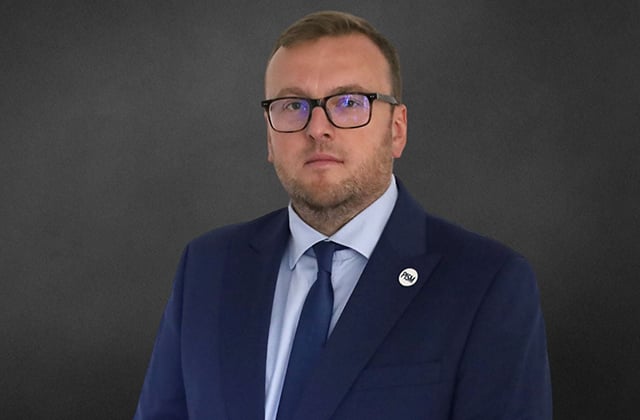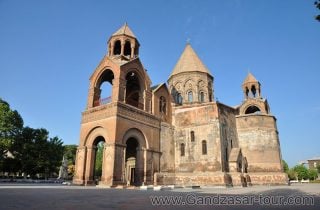The coming weeks and months could prove decisive in terms of the future and position of Armenia and Georgia: Wojciech Wojtasiewicz

168.am’s interview with Wojciech Wojtasiewicz, analyst for the South Caucasus countries, Eastern Europe Programme, The Polish Institute of International Affairs:
-How would you assess the situation in the South Caucasus?
-The situation in the South Caucasus region is extremely dynamic. The South Caucasus republics face many challenges in the near future. In the case of Georgia, it is the upcoming parliamentary elections (26 October) that will be crucial for the country in terms of its political system (democracy vs. authoritarianism) and foreign policy direction (return to integration with the EU and closer relations with the USA vs. rapprochement with Russia and China). It is difficult to estimate which political camp is likely to win (the ruling Georgian Dream party or the pro-Western opposition going into the elections in four political blocks). Pre-election polls do not give a clear answer as to who will win the elections (depending on who is conducting them they yield extremely different results). What is certain, however, is that the Georgian Dream will do everything to retain power. I expect massive post-election demonstrations by the opposition and street confrontations between those in power and their opponents.
In the case of Armenia and Azerbaijan, the key issue remains the peace process, which has reached an impasse in recent months. The countries accuse each other of torpedoing it. It seems that Armenia is much more interested in signing a peace treaty than Azerbaijan. Baku is currently focused on hosting the COP29 climate conference, which will take place in November. This will be the largest international event in the history of independent Azerbaijan and a major logistical and organisational challenge for the country. In addition, the challenge for Azerbaijan remains the reconstruction of Karabakh, which has been recovered in recent years, and encouraging the international community (both states and private investors) to join the process (assistance in demining the area, infrastructure investment).
Armenia, on the other hand, fears a resumption of military action by Azerbaijan against it in connection with the ongoing process of demarcation and delimitation of the Azerbaijani-Armenian border and the lack of resolution of the unblocking of transport routes in the South Caucasus region to pass through Armenia, including the so-called Zangezur transport corridor. In this regard, it continues to strengthen its armed forces by purchasing military equipment from India and France, among others. In addition, it remains challenged to reorient its foreign policy from its hitherto pro-Russian course to a pro-Western or multi-vector one (strengthening relations with the EU, the US, but also with Iran, no final decisions on leaving the Collective Security Treaty Organisation and the Eurasian Economic Union). This is an extremely difficult task, as Russia will do everything to prevent Armenia from leaving its sphere of influence, just like Georgia.
To sum up, the coming weeks and months could prove decisive in terms of the future and position of Armenia and Georgia. Azerbaijan, on the other hand, will strengthen its position on the international arena, a sign of which is the assertive attitude of the country towards the broader West, the development of partnership relations with Russia on an equal footing, as well as the notification of its accession to BRICS+, which, according to the Azerbaijani authorities, is expected to strengthen Azerbaijan’s importance in the world and positively influence its economic development (strengthening trade opportunities with other BRICS+ member states).
-Azerbaijan is trying to become a sub-hegemon country in the South Caucasus region. Azerbaijan launched a bid to join BRICS after Putin visited Baku in August 2024. In July 2024 China and Azerbaijan signed a declaration on strategic partnership. What kind of threats do you see from Azerbaijani cooperation with China and Russia for the Western countries?
-By strengthening relations with Russia and China, as well as by declaring its accession to the BRICS+ platform, Azerbaijan is making it clear to the West that it is not the only direction of its foreign policy. This action is in line with the traditional Azerbaijani policy of multi-vectorism, i.e. maintaining correct relations and cooperation with all partners if this benefits Azerbaijan. In my view, Azerbaijan’s recent rapprochement with Russia and China (a similar strategic partnership agreement was signed with China a year earlier by Georgia) is a warning sent to the West by its authorities that Azerbaijan may reduce cooperation, particularly of an economic nature, with the US and the EU because it has alternative partners. Consequently, the EU should abandon any idea of criticising the Azerbaijani authorities with regard to permanent violations of democracy (uncompetitive parliamentary and presidential elections, de facto liquidation of the opposition) and human rights (persecution of free media, NGOs, rights activists), or of putting pressure on Azerbaijan regarding the peace process with Armenia.
Azerbaijan seems to be saying: even if we were to use force against Armenia regarding the demarcation and delimitation of our border with this country or force it to open the so-called Zangezur transport corridor, do not dare impose any sanctions on us or give up the purchase of our natural resources: oil and gas, because we can acquire alternative customers as well as offset possible losses with investments from China and other BRICS+ members. Azerbaijan hopes that participation in this platform will enable it to develop its transport infrastructure and integrate it into the international transport corridor system, as well as enabling it to develop other non-mineral economic sectors. Moreover, it is the EU that is in need when it comes to purchasing natural resources from alternative sources, having given up on importing them from Russia after its full-scale aggression against Ukraine in 2022.
In fact, Azerbaijan is the only subjective state in the South Caucasus region that is able to talk to external actors such as the EU or Russia as equals. This is due to its economic strength (a country rich in natural resources, which are the main source of its revenue) as well as its military-geopolitical strength (a strong army trained and rearmed by Israel and Turkey, the victorious so-called Second Karabakh War and the regaining of control over Karabakh after three decades). By contrast, Armenia and Georgia remain objects rather than subjects in the game of regional and global powers.
-In recent months, Azerbaijan has expressed concerns regarding the growing military cooperation between the United States and Armenia. However, is this not true, and even the U.S. Ambassador in Baku talked about that. There are some discussions in Armenia that Azerbaijan may start another war, this time against the Syunik region in Armenia, in order to get the so-called “Zangezur Corridor” and blame the USA for that. Do you see a possibility for that kind of scenario or there are other purposes under Azerbaijani statements?
-This summer, an Armenian-US military exercise code-named ‘Eagle Partner 2024’ took place on Armenian territory. This was one of the elements of Armenia’s strengthening relations with the West, including the US, and distancing itself from Russia (e.g. freezing membership of the Collective Security Treaty Organisation, withdrawal of Russian border guards from Zvartnots airport). In the spring of this year, Armenia also hosted the NATO Secretary General (a wider trip to countries in the region, including Azerbaijan and Georgia).
Armenia, after losing the so-called Second Karabakh War and becoming disillusioned with the attitude of its long-standing ‘ally’ Russia, has begun to reorient its foreign policy and seek new guarantors of its security in the face of its hostile neighbours Azerbaijan and Turkey. So far, however, Armenia has not explicitly declared a desire to join NATO, of which the US is a major pillar. It would first have to withdraw from CSTO and dismantle Russian military bases on its territory, as well as take control of its borders with Turkey and Iran (Russian border guards are currently stationed there). However, the US has pledged to help Armenia modernise its military (exercises, training, advice).
They are to allocate $350 million for this purpose. However, this cooperation will not include the supply of military equipment. This Armenia has been mainly importing from India and France in recent years. This does not change the fact that these announcements have been met with criticism and strong opposition from Russia and Azerbaijan. The latter accuses Armenia of militarisation in order to retake Karabakh in the future. In addition to the US, Azerbaijan’s targets of criticism include India and France (because of its pro-Armenian stance, Azerbaijan withdrew from mediation under the auspices of European Council President Charles Michel). However, the strengthening of Armenia’s military potential, in my opinion, is not so much due to offensive plans, but rather defensive ones, i.e. preparations to ward off possible Azerbaijani aggression if a peace treaty were not signed and Azerbaijan wanted to take over by force some of the disputed territories along the Azerbaijani-Armenian border or open the so-called Zangezur transport corridor. Armenia, while wanting peace with Azerbaijan and the settlement of bilateral relations through a peace treaty, is at the same time preparing to repel possible Azerbaijani aggression in case the peace process fails.
-The third match of the 3+3 format took place last week, this time in Turkey. In your opinion, how viable is that format, considering Georgia’s position, and can the situation change in the same Russian-Georgian relations after the elections in Georgia?
-In my view, the 3+3 format for the South Caucasus initiated in December 2021 by Turkish President Recep Tayyip Erdoagan is an attempt to at least consolidate and, in the long term, strengthen the influence of Turkey, Russia and Iran, and the limitation of the EU and the US, in the South Caucasus region. Armenia, due to its weakness and international isolation (closed borders and lack of diplomatic relations for three decades with its neighbours Turkey and Azerbaijan), is forced to participate in this format. Azerbaijan, due to its strength and subjectivity, treats this format as one of many instruments to strengthen its international position and exert influence over neighbouring Armenia.
So far, Georgia has consistently refused to participate, indicating that it will not take part in multilateral talks involving Russia – a country with which it has not had official diplomatic relations since 2008 and which occupies around 20% of its territory (Abkhazia and South Ossetia). However, a change in the Georgian government’s approach on this issue cannot be ruled out if the Georgian Dream retains power after the upcoming parliamentary elections.
This could be one element of an overall reorientation of Georgia’s foreign policy and a new opening in Georgian-Russian relations. During the election campaign, the leaders of the ruling party repeatedly stressed that they needed a constitutional majority to restore the country’s territorial integrity. In this connection, there was speculation that Russia was unofficially offering Georgia assistance in resolving the problems with Abkhazia and South Ossetia by having Georgia recognise their independence and then create a confederation with them. The Georgian authorities have denied such rumours, but it cannot be ruled out that Russia and the separatist republics will make some concessions to Georgia in the near future in exchange for a de facto freeze on its integration with the West (EU and NATO). Georgia’s accession to the 3+3 format would certainly have a positive impact on its effectiveness.
By Razmik Martirosyan

























